The educational materials listed on this page are about Organic Agriculture.
Organic agriculture integrates “cultural, biological and mechanical practices that foster cycling of resources, promote ecological balance, and conserve biodiversity.” Organic and sustainable agriculture often include the use of cover crops, crop rotation, use of tools and machinery for weed and pest management, and conservation tillage. Synthetic fertilizers, sewage sludge, irradiation and genetic engineering may not be used for food to be certified and labelled USDA organic. Organic livestock must have access to the outdoors and be “fed 100 percent certified organic feed, managed without antibiotics, added growth hormones, mammalian or avian byproducts, or other prohibited feed ingredients.” SARE has many helpful reads including Transitioning to Organic Production, which addresses conversion strategies, organic farming production practices, marketing approaches and federal organic standards for certified organic crop and livestock. SARE’s Crop Rotation on Organic Farms reviews how rotating crops improve soil quality and health and help manage pests, diseases, and weeds.
Showing 1-10 of 37 results
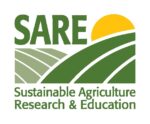
The Northeast Organic Grower Harvest Manual
A manual created by Roxbury Farm Harvest to help commercial, organic vegetable farmers with parameters on pricing, harvest indicators, harvest and postharvest handling procedures, and storage conditions. Each vegetable has a detailed explanation of the various market values, expected yield numbers, standards and the tools needed. Harvest and preparation procedures are laid out for each […]
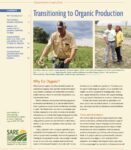
Transitioning to Organic Production
Transitioning to Organic Production lays out many promising conversion strategies, covering typical organic farming production practices, innovative marketing ideas and federal standards for certified organic crop production.
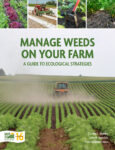
Manage Weeds On Your Farm
Manage Weeds on Your Farm is a definitive guide to understanding agricultural weeds and how to manage them efficiently, effectively and ecologically—for organic and conventional farmers alike.
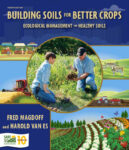
Building Soils for Better Crops
The fourth edition of Building Soils for Better Crops—enhanced and expanded—explains how to use ecological principles to build soil health and boost fertility, yields and overall sustainability.
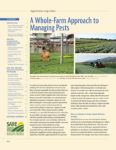
A Whole Farm Approach to Managing Pests
This 16-page bulletin helps producers—and the educators who work with them—use ecological principles across the entire farm to control pests.
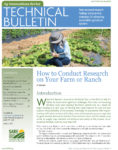
How to Conduct Research on Your Farm or Ranch
This 32-page bulletin outlines how to conduct research at the farm level, offering practical tips for both crop and livestock producers, as well as a comprehensive list of more in-depth resources.

Special Topics with Cover Crops and Soil Health
Organic and Specialty Crops Grazing Cover Crops Soil Health Policy Issues
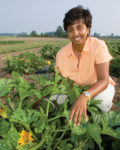
National Continuing Education Program
This program is designed for Cooperative Extension and Natural Resource Conservation Service personnel, and is also open to farmers, ranchers, and other agricultural professionals nationwide. It emphasizes core concepts and a basic understanding of sustainable agriculture, its goals and its relevance to every farming and ranching operation—large or small. The core of the national continuing education program is a series of three online courses. Take them now.
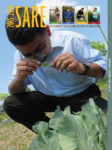
2015/2016 Report from the Field
Read about SARE-funded work in the areas of sustainable dairy cropping systems, soil health assessments, nutrient management, cover crops, beginning farmers, pollinators, technical assistance programs for women farmers, and more. This edition includes highlights of projects funded through the graduate student program, and the highly regarded Sustainable Agriculture Fellowship, a professional development program coordinated by SARE and NACAA.

Cover Crop Innovators Video Series
Find short video profiles of farmers around the country who are using cover crops on their land.